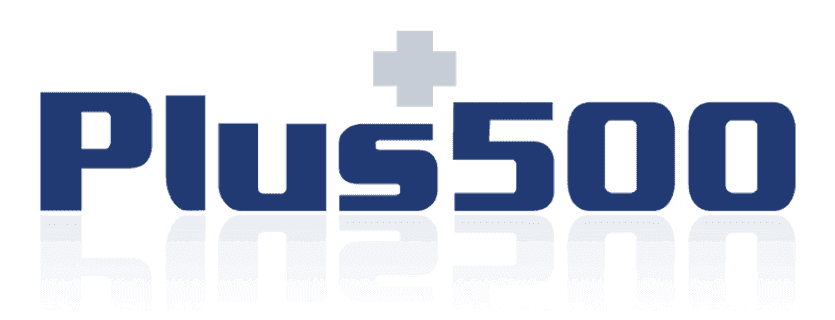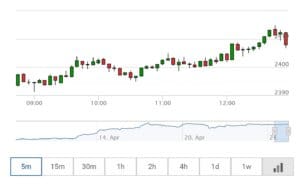Best Day Trading Platforms for 2026
Day trading involves buying and selling an asset in the course of a single day. This type of trading is quite different from other types of investing since each trade only lasts a few minutes or a few hours.
While day trading is by no means easy, it can be extremely profitable. Many traders use day trading as a way to supplement their income. Others are able to consistently turn a profit and make a living as a full-time day trader.
Whatever your day trading goals, it’s essential that you find the right broker and tools for the job. To help, we’ll take a closer look at the three best day trading platforms you can use in 2026. We’ll also cover in detail everything you need to know about choosing the day trading platform that’s right for you.
Top 2 Day Trading Platforms
You can read all about the best day trading platforms further down this page, but if you’re just looking for a quick rundown, here’s a list of the top providers in 2026
- Plus500 – Popular day trading platform with tight spreads
- AvaTrade – Excellent day trading platform with MT4/5
-
-
Best Day Trading Platforms for 2026
Competition among trading platforms for day traders’ business is intense. That’s been a good thing for traders, since brokers are offering more assets for trading and lower fees than ever before.
Still, to succeed as a day trader, you need a trading platform that caters to your strategy while offering as many extra tools as possible. With that in mind, let’s dive into our recommendations for the three best day trading platforms in 2026.
1. Plus500 - Best Day Trading Platform for Leverage
Plus500 offers a wide range of assets to trade through CFDs and plenty of leverage with which to make the most of your positions. For forex and cryptocurrencies, you can trade on margin up to 30:1, while global stocks trade with around 20:1 leverage in most cases.
While you can find this degree of leverage at other day trading platforms, Plus500 also stands out for being extremely cost effective. The platform doesn’t charge trade commissions and offers extremely tight spreads. This is especially true for forex where spreads at Plus500 are typically 0.1% or less.
In terms of research tools, Plus500 has all the basics that day traders need to be covered. In addition to technical charts, the platform offers customizable price alerts and an economic calendar. We particularly appreciate that Plus500 includes risk management tools that allow traders to set stop-loss and take-profit levels for every trade.
- Assets: Stocks, ETFs, Options, Cryptocurrencies, Forex, Commodities
- Demo Account: Yes
- Trade Commissions: No
- Research Tools: Basic charts, price alerts
- Minimum deposit: $100
OUR RATING

- High Leverage: Trade forex up to 30:1 and stocks up to 20:1
- Tight Spreads: Day trade without fees eating into your profits
- Risk Management: Set stop-loss and take-profit levels for every trade
- Basic Charts: Cannot develop custom indicators or strategies
CFDs are complex financial instruments and 80.5% of retail investor accounts lose money when trading CFDs.2. AvaTrade - Best Day Trading Platform for Research
AvaTrade is one of the most powerful platforms available for advanced day traders who want to develop custom strategies. This broker comes with not only its own proprietary charting software, but also access to MetaTrader. This extremely popular charting tool gives you the tools you need to create custom technical studies, backtest strategies, and dive deep into analyzing price data. Even better, AvaTrade has a mobile app that integrates with MetaTrader mobile to enable trading on the go.
We also like AvaTrade for its selection of assets to trade. The platform offers a wide range of forex pairs for currency day traders as well as the ability to trade forex options contracts. For major forex pairs, you can trade with up to 400:1 leverage, which in itself is pretty impressive. AvaTrade also allows you to trade stocks from the New York and London stock exchanges, with leverage ranging up to 20:1.
Unfortunately, you will end up paying a bit more for AvaTrade than for other day trading platforms. This broker charges spreads of more than 0.25% for many forex pairs and spreads for stocks can be even higher. There are no trade commissions or other fees, though, and most traders will still spend less on spreads than they would to buy a standalone MetaTrader license. Assets: Stocks, ETFs, Cryptocurrencies, Forex, Forex Options, Commodities Demo Account: Yes Trade Commissions: No Research Tools: Advanced Charts, MetaTrader 4 Minimum deposit: $100
OUR RATING
- MetaTrader: Get access to advanced charting software
- Mobile Trading: AvaTrade Go app integrates with MetaTrader
- Forex Options: Trade forex as contracts-for-differences or options
- Expensive Spreads: Cost of research tools is reflected in spreads
80.5% of all retail CFD accounts lose money.Choosing the Best Day Trading Platform
With so many choices for the top day trading platform, it’s essential to have an idea of exactly what you’re looking for. So, let’s take a closer look at some of the factors you should consider when choosing a broker for day trading.
Asset Types
The first thing you need to decide on is what type of asset you want to focus on for day trading. While same-day traders may speculate on both forex and stocks, for example, it’s a good idea to start out with just one asset in mind.
Whether you want to day trade stocks, forex, commodities, or something else, you’ll need to make sure that your trading platform offers a wide variety of individual trading options. That means plenty of stocks to choose from or a wide range of forex pairs. The more choices your brokerage gives you, the more opportunities you’ll be able to find for trading even on slow market days.
Commissions and Spreads
As a day trader, you’ll be placing a lot of trades. So, it’s extremely important to think about how much each of those trades will cost you.
Per-trade commissions charged by your broker can quickly eat into your profits. Worse, safely scaling into and out of positions by placing multiple trades actually ends up costing you more money. As a result, every daytrader should look for commission-free platforms for trading. All three of the platforms we recommend are commission-free.
Even without commissions, you’re still starting from behind when day trading because of the spread. This is the difference between what it costs to buy an asset compared to what you would get for selling that same asset at the same time.
Spreads vary widely between trading platforms and asset classes, from as little as 0.025% for some forex trades to nearly 1% or more for some stock trades. Make sure that you evaluate what your prospective broker is charging specifically for the type of asset you want to trade.
Leverage
Leverage is also an important factor for day traders to consider in a trading platform. With leverage, you can multiply the effective size of your position. That means that if you trade at a 10:1 margin, your returns will be 10 times larger than the underlying change in the price of the asset you’re trading.
This is key since it enables day traders to make significant returns without investing huge amounts of money. While a stock may only move by one to two percent in a day, trading with leverage allows you to realize gains of 10% or even more.
The other advantage day traders get from leverage is that since you don’t have to commit a huge sum of money, you can spread the money you do have across multiple positions. This ensures that you can hedge bets and place a lot of trades in the span of a single day.
Importantly, some trading platforms only offer a small amount of leverage while others enable you to multiply your positions hundreds of times over. Be sure to check how much leverage a trading platform offers before committing to it.
You’ll also need to watch out for your broker’s margin requirement. This is the relative value (as a percentage) of your leveraged positions that you need to keep as cash in your account. For day traders that rely heavily on leverage, it’s worth looking for platforms that offer the lowest margin requirement for the asset you want to trade.
Research Tools
Most modern-day trading platforms are much more than just brokerages. They also include a full suite of research tools, technical charting software, price alerts, and more.
These tools are absolutely essential to day traders. They enable you not only to spot trading opportunities but to further analyze them to decide if they are likely to turn a profit. The more research tools your trading platform offers, the better.
It’s particularly worth taking a close look at the charting software your trading platform offers. Technical charts are at the heart of most day traders’ strategies regardless of what assets they are trading. Some technical charts offer price data but little in the way of technical studies or custom analysis. Other charting software, like MetaTrader, is much more robust and enables you to create your own technical indicators or to backtest a strategy.
When considering whether a trading platform has the research tools you need, keep in mind that there are tons of third-party options for researching day trades. But, if you go outside your trading platform, you’ll likely end up spending more money. You may also lose out on the ability to place trades right from your charting or research software.
In general, your best bet is to choose a trading platform that includes all the research components you need to trade successfully.
Conclusion
Day trading offers a chance to make consistent money from trading on a day-to-day basis. While succeeding as a day trader requires insight and practice, turning a profit is much easier if you have the best day trading platform.
That means having access to the assets and tools you need to take advantage of every opportunity, as well as minimal fees that won’t eat into your returns. With our recommendations for the three best day trading platforms, you can get started making money as a day trader today.
FAQs
Are there any disadvantages to day trading stock CFDs?
For day traders, there is virtually no downside to trading contracts for differences (CFDs) as opposed to buying and selling stocks directly. In general, the main disadvantage to using CFDs is that they do not make you eligible to collect dividends. However, since day traders don’t hold positions overnight, they are very rarely eligible for dividends in any case.
What is the difference between CFDs and options?
Both CFDs and options are derivatives, but they work somewhat differently. Holding a CFD is like holding the underlying asset directly. Options, on the other hand, give you the choice to buy an asset at a preset strike price. They also expire on a specific date, which means that the timing of a price change needs to happen precisely in order to realize a profit.
What happens if my account balance drops below my broker’s required margin?
It’s not uncommon to see your trading account drop below the amount of margin you’re required to have based on your current leveraged positions. When that happens, you’ll get what’s known as a margin call from your broker. You’ll either need to deposit more money or unwind some of your positions within five days.
How much money do I need to start day trading?
How much money you need to daytrade depends on your trading platform and what types of assets you’re trading. In general, it’s a good idea to have at least several hundred dollars. Having several thousand dollars in your trading account will ensure you don’t end up with frequent margin calls.
Michael Graw
View all posts by Michael GrawMichael is a writer covering finance, new markets, and business services in the US and UK. His work has been published in leading online outlets and magazines.
WARNING: The content on this site should not be considered investment advice. Investing is speculative. When investing your capital is at risk. This site is not intended for use in jurisdictions in which the trading or investments described are prohibited and should only be used by such persons and in such ways as are legally permitted. Your investment may not qualify for investor protection in your country or state of residence, so please conduct your own due diligence. Contracts for Difference (“CFDs”) are leveraged products and carry a significant risk of loss to your capital. Please ensure you fully understand the risks and seek independent advice. This website is free for you to use but we may receive commission from the companies we feature on this site.
Copyright © 2026 | Learnbonds.com
We use cookies to ensure that we give you the best experience on our website. If you continue to use this site we will assume that you are happy with it.Scroll Up





